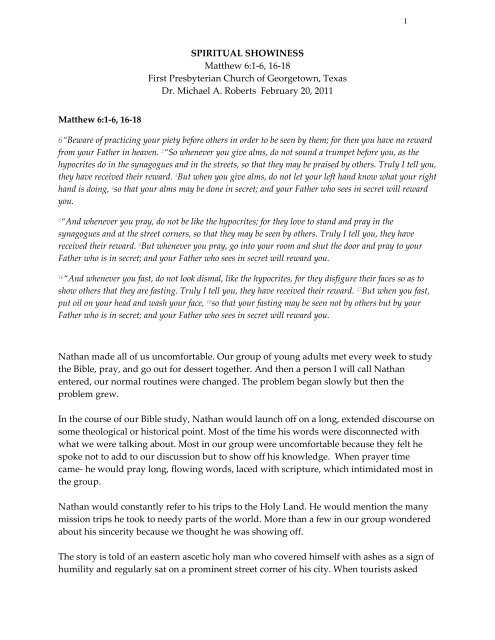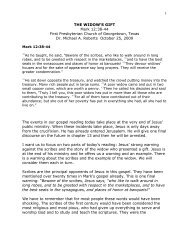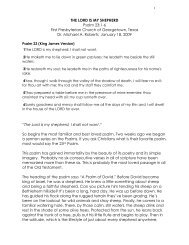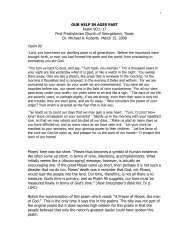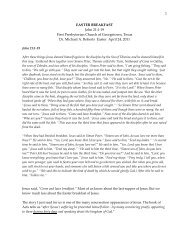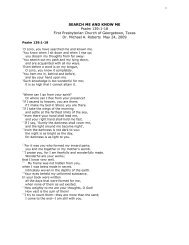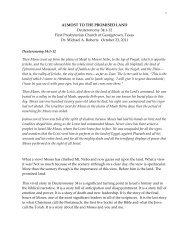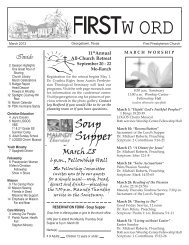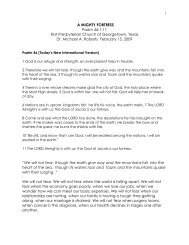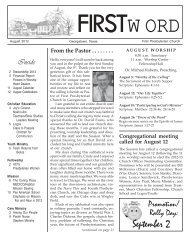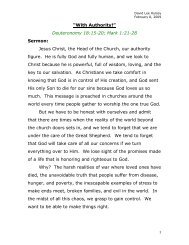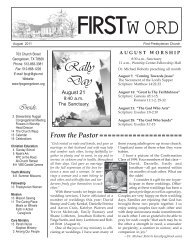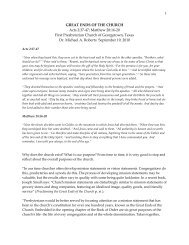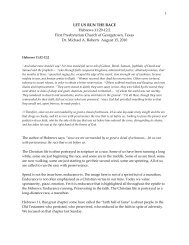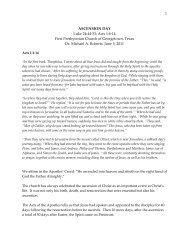SPIRITUAL SHOWINESS Matthew 6:1-6, 16-18 First Presbyterian ...
SPIRITUAL SHOWINESS Matthew 6:1-6, 16-18 First Presbyterian ...
SPIRITUAL SHOWINESS Matthew 6:1-6, 16-18 First Presbyterian ...
You also want an ePaper? Increase the reach of your titles
YUMPU automatically turns print PDFs into web optimized ePapers that Google loves.
1<br />
<strong>SPIRITUAL</strong> <strong>SHOWINESS</strong><br />
<strong>Matthew</strong> 6:1-6, <strong>16</strong>-<strong>18</strong><br />
<strong>First</strong> <strong>Presbyterian</strong> Church of Georgetown, Texas<br />
Dr. Michael A. Roberts February 20, 2011<br />
<strong>Matthew</strong> 6:1-6, <strong>16</strong>-<strong>18</strong><br />
6“Beware of practicing your piety before others in order to be seen by them; for then you have no reward<br />
from your Father in heaven. 2 “So whenever you give alms, do not sound a trumpet before you, as the<br />
hypocrites do in the synagogues and in the streets, so that they may be praised by others. Truly I tell you,<br />
they have received their reward. 3 But when you give alms, do not let your left hand know what your right<br />
hand is doing, 4 so that your alms may be done in secret; and your Father who sees in secret will reward<br />
you.<br />
5<br />
“And whenever you pray, do not be like the hypocrites; for they love to stand and pray in the<br />
synagogues and at the street corners, so that they may be seen by others. Truly I tell you, they have<br />
received their reward. 6 But whenever you pray, go into your room and shut the door and pray to your<br />
Father who is in secret; and your Father who sees in secret will reward you.<br />
<strong>16</strong><br />
“And whenever you fast, do not look dismal, like the hypocrites, for they disfigure their faces so as to<br />
show others that they are fasting. Truly I tell you, they have received their reward. 17 But when you fast,<br />
put oil on your head and wash your face, <strong>18</strong> so that your fasting may be seen not by others but by your<br />
Father who is in secret; and your Father who sees in secret will reward you.<br />
Nathan made all of us uncomfortable. Our group of young adults met every week to study<br />
the Bible, pray, and go out for dessert together. And then a person I will call Nathan<br />
entered, our normal routines were changed. The problem began slowly but then the<br />
problem grew.<br />
In the course of our Bible study, Nathan would launch off on a long, extended discourse on<br />
some theological or historical point. Most of the time his words were disconnected with<br />
what we were talking about. Most in our group were uncomfortable because they felt he<br />
spoke not to add to our discussion but to show off his knowledge. When prayer time<br />
came- he would pray long, flowing words, laced with scripture, which intimidated most in<br />
the group.<br />
Nathan would constantly refer to his trips to the Holy Land. He would mention the many<br />
mission trips he took to needy parts of the world. More than a few in our group wondered<br />
about his sincerity because we thought he was showing off.<br />
The story is told of an eastern ascetic holy man who covered himself with ashes as a sign of<br />
humility and regularly sat on a prominent street corner of his city. When tourists asked
2<br />
permission to take his picture, the mystic would rearrange his ashes to give the best image<br />
of destitution and humility. Rearranging the ashes- an interesting description of the<br />
spiritual life.<br />
Jesus says in <strong>Matthew</strong> 6:1 "Beware of practicing your piety before others to be seen by them." This<br />
verse introduces 6:2-<strong>18</strong> just as 5:20: “Unless your righteousness exceeds that of the scribes and<br />
Pharisees, you will never enter the kingdom of heaven” introduced the rest of chapter 5. Chapter<br />
5 focused on personal and social ethics. Chapter 6 focuses on matters of spiritual<br />
observance (R.T. France pp. 233-234).<br />
The main theme today is Jesus' headline: "Beware of practicing your piety before others to be<br />
seen by them." I think the New English Bible captures the sense of this well when it says: "Be<br />
careful not to make a show of your religion." Everything else in our passage flows from this<br />
headline.<br />
Most of us like being noticed in our lives. As a child, we said "watch me"- watch me build<br />
this sandcastle, watch me do this cartwheel, watch me spell this word,<br />
watch me shoot this basket. When we grow up we're not as obvious about it but we still<br />
want to be noticed. Notice me doing a good job, notice me helping this person, notice my<br />
intelligence, notice my humor. Sometimes this noticing carries over to our spiritual life.<br />
Notice what I know about the faith, how I pray, what I give. Notice how really spiritual I<br />
am. Or claim to be.<br />
Jesus is concerned about theatrical spirituality. Being spiritual in order to be seen by<br />
people. In our passage "to be seen" is the root of our word theater. Acting spiritual. All<br />
churches have people who seem to be that way.<br />
The motivation for the spiritual life is what is at issue here. Is our piety performed to affect<br />
status with God or with people Jesus says that piety done to affect status with people only<br />
achieves status with people. But it doesn't count with God. What is the ultimate purpose of<br />
our spiritual activities Our service, our prayer lives, our study and reflection, our mission<br />
What is our ultimate purpose To make connection with and commune with God, not to<br />
impress people.<br />
St. Augustine points out the deadly danger of Jesus' saying: "The love of honor is the<br />
deadly bane of true piety. Other vices bring forth evil works but this brings forth good<br />
works in an evil way."<br />
In our passage Jesus addresses the way we give, the way we pray, and the way we fast.<br />
These are three common forms of Jewish piety. Jesus assumes that we will be involved in<br />
the spiritual life. The issue is not whether we will but how one practices their faith.
3<br />
“So when you give to the needy, do not announce it with trumpets...but when you give do not let<br />
your left hand know what your right hand is doing." Trumpets were blown when calling people<br />
to a feast and other important occasions. But there is no record of somebody blowing a<br />
trumpet to announce their gift. That practice would have been as unusual as it would be<br />
today if somebody had a brass band announce their presence at church or having a string<br />
quartet play while we put our check in the offering plate.<br />
After they laughed at Jesus' exaggeration, they might have got his point. When we give, we<br />
don't make a show of it. We don't play a trumpet for the world to notice, or have a camera<br />
to record the special moment of our benevolence. We do not give for the crowd or the<br />
camera. We give because it is an integral part of our relationship with God.<br />
For some of us, this is not a real problem. We don't announce to our neighbor that we're<br />
going to give a big gift to a worthy mission. We're too reserved for that. Our struggle is<br />
with the inward trumpets. Dale Bruner put it well when he writes: "Not only should there<br />
be no trumpets or public flurry; there should not even be any internal music, not even<br />
violins in the background which might comfort us with the notion that after all we are<br />
pretty good people." We can be as self- serving privately as we can be publicly.<br />
“Don't let your left hand know what your right hand is doing.” That's physically impossible.<br />
This is another humorous exaggeration to make a point. A Christian gives without<br />
impressing ourselves with what we have given. We don't tell others what we give and we<br />
don't even tell ourselves.<br />
Jesus wants us to know that it’s possible to turn an act of mercy into an act of vanity. The<br />
only genuine reward love wants is to see the need met. Our Lord is concerned with our<br />
motivation for giving. Do you remember Paul's words to the church of Corinth “Each one<br />
should give what you have decided in your heart to give, not reluctantly or under complusion, for<br />
God loves a cheerful giver.” Paul was trying to raise funds for a very important mission but he<br />
was concerned about the giver's motivation.<br />
The gift of money can help people. A gift given in a theatrical way can also hurt. The work<br />
of God needs money, and money is a good thing. But it’s a pity if it is given with theatrics.<br />
Maybe it just me, but it seems that this passage encourages healthy, generous, committed<br />
giving which no one knows about but God.<br />
“And when you pray, do not be like the hypocrites who love to stand and pray in the synagogues and<br />
the street corners to be seen by people." This is not a common experience for us- seeing<br />
somebody pray for show. We don't often see somebody who prays because they love to<br />
hear their own voice. Actually, in other church traditions that I've been a part of the
4<br />
practice is more common: using long, flowing words that impresses people but forgets who<br />
we're praying to.<br />
In my experience, <strong>Presbyterian</strong>s are not showy prayers. They have the opposite problemwe're<br />
inhibited from praying publicly at all. We're not sure we would say the right thing.<br />
Or that we will pray long enough.<br />
Prayer is conversing with God, honestly and naturally. Liturgical resources and prayer<br />
collections support this aim but should not take away from it. In prayer we are talking to<br />
God not to people. Prayer is rooted in a desire to commune with God not in a desire to<br />
make a public display of our spirituality.<br />
Jesus tells us that when we pray we are to go into our room and pray to the loving God in<br />
private. This room probably refers to the supply room which was the only room that could<br />
be locked in the house. It was used to store feed, small animals, tools and other supplies.<br />
But it could be locked, it could be private, and that was the supreme consideration. We<br />
close the door not only to lock out distraction and disturbance but also to resist the<br />
temptation to impress others.<br />
Nowadays there are many places to be alone with God. There may be a place in your<br />
house. Some find praying while walking to be helpful. Many Christians today find their<br />
cars a good place to pray. But if you drive and pray keep your eyes open.<br />
Jesus is often portrayed as praying privately (Mark 1:35, 6:46), but it should also be pointed<br />
out that on occasion Jesus prayed aloud where others could hear him (<strong>Matthew</strong> 11:25,<br />
14:19, 26:39, 42). The prayer we know as the Lord’s Prayer which we will look at in two<br />
weeks is worded in the plural, as a corporate prayer rather than a private one. Gatherings<br />
for public prayer together were a regular feature of the life of Jesus’ disciples from the very<br />
beginning. The issue here is not whether prayer is public or private but the direction of<br />
prayer- to God or for people (R.T. France p. 239).<br />
The last spiritual discipline Jesus mentions is probably the least familiar to us. Few<br />
Protestants fast for any reason during any time. Fasting, though, is a historic, ancient<br />
discipline in the church particularly during the season of Lent. Fasting was also an<br />
important part of the Jewish faith. They fasted on the Day of Atonement as well as other<br />
special days. The Pharisees made a practice of fasting twice a week.<br />
The purpose of fasting is to go without food to focus one's attention and energy on God.<br />
Jesus assumed that his followers would fast. He said "When you fast..." not "If you fast."<br />
There are a number of biblical reasons to fast: to help us to humble ourselves before God,<br />
when we are repentant for what we've done, when we are seeking guidance. Jesus often
5<br />
fasted when he was making significant decisions. Another reason is to appreciate what<br />
many people around the world go through on a daily basis.<br />
The issue for Jesus though is those who fast in a showy way. They would put ashes on their<br />
head which would dirty up a person's face. It would give them an ashen look. This would<br />
make them look gloomy, disfigured, dismal. They would draw attention to themselves. We<br />
could probably draw attention to ourselves today by just announcing that we're fasting.<br />
That would be impressive.<br />
It is interesting when this scripture was used by the church. Traditionally, our scripture<br />
reading in <strong>Matthew</strong> 6 was and is used on a particular day in the church year- Ash<br />
Wednesday. This is the beginning of the season of Lent, the most common period of fasting<br />
in the church. By the fourth century, the season of Lent had developed from a two-day fast,<br />
through a week-long fast, to a biblical “forty days” not including Sundays. This was<br />
modeled on Jesus’ forty days in the wilderness when he also fasted.<br />
Using our gospel reading for the beginning of the Lenten season shows the wisdom of the<br />
church. They were saying-- even during this special season preparation, even during this<br />
time of fasting, even when ashes are placed on the forehead-- be careful, Christian people,<br />
about spiritual showiness.<br />
We are spiritual for God not people. We serve to please God not to get recognition. We<br />
have experiences to be helpful to people not to impress them.<br />
We can bluff a human audience. People can think we are genuine. They watch us give,<br />
pray, serve and they say "Wow, here is a committed Christian!" But if we're bluffing, God is<br />
not fooled. God can see right through our fake modesty and generosity, through our<br />
spiritual showiness.<br />
What God desires is honesty, integrity, heart-felt commitment. God desires generosity,<br />
conversation, and spiritual practices that flow from our deep commitment to love God with<br />
all our heart, soul, mind, and strength.


